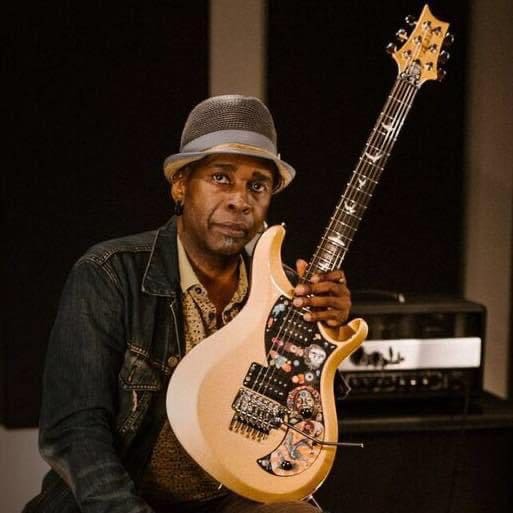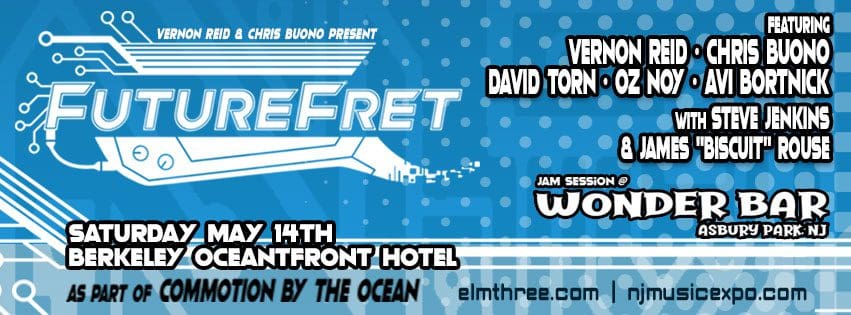Vernon Reid has a long and storied history not just as a guitarist (for Living Colour and countless other solo and guest endeavors) but also one of the most forward-thinking musicians of the last few decades. Continuing that tradition, Reid is putting together Episode One of FutureFret with a cadre of stupendous artists and clinicians backing him up.
Episode One will feature Reid, Chris Buono (CB3 Trio), Oz Noy, Avi Bortnick (sideman for John Scofield), David Torn (who’s worked with David Bowie, k.d. lang, John Legend, Madonna and Tori Amos), Steve Jenkins and James “Biscuit” Rouse (drummer for Nile Rogers & Chic, Stevie Wonder, Chaka Khan, Usher and Pharrell Williams) at The Berkley Oceanfront Hotel on Saturday May 14 as a part of Commotion by the Ocean, presented by NJ Music Expo. The day will take place in three parts — an introspective panel, a deep-dive masterclass and then a jam session across the street at The Wonder Bar.
Recently, Vernon Red took some time to chat with me about what excites him about FutureFret, being a gear nerd, and the future of the guitar in general.
Andrew Howie: So what can you tell me about this FutureFret event? Who all is part of it, how did it come together, and what’s it all about?
Vernon Reid: So we’re calling it FutureFret: Episode One. One of my main partners in this, Chris Buono, he’s a TrueFire clinician and studio guitarist; he’s worked with a ton of people. We’re both big pedal and effects nerds. A while ago, I said there needs to be another kind of conversation around guitar and gear and where they’re going, and there needs to be another kind of dialogue between manufacturers and users. The two of us arrived at this consensus: the whole idea that you would just stick with a single type of effect and that would be your thing, that’s really not a current idea anymore. Technology is moving really rapidly, and I just thought it would be great to have a public situation where people could ask questions and meet with clinicians. That was the vision. For this first one we’re trying, we have a great group of really forward-looking instrumentalists, theorists, it’s just great. I’m really thrilled with this first group of people that are going to play and share their insights.

AH: Tell me a little more about the group you’ll have on site.
VR: So Chris and I have been friends for a while; we’ve known each other from the scene, and we just get along well, we make each other laugh. He’s a very insightful person about a lot of things, just about life itself. He’s a badass guitarist, but more importantly he’s a good person. That increasingly is what I cherish about my association with players that I know and have played with; just the people who are really solid people that can talk about real things.
This group also includes Avi Bortnick, who plays a lot with John Scofield; Oz Noy, just a ridiculous player in jazz, rock, just really quirky, and has found a way to be not just a badass guitarist, but phenomenal in the way he works with effects; and the legendary David Torn, whom I was in a group with along with Elliot Sharp. He’s the person who really coined the term ‘electronic guitarist.’ He’s also a film composer, and generally one of the high priests of the use of effects as well as freeform improvisation to create these magical soundscapes. He did a whole bunch of very cutting edge sampling featuring his approach to guitar back in the day, so it’s really cool to have him as part of it. There’s also of course Chris and myself, we have Steve Jenkins, who’s a bass player I’ve worked with a ton, and James “Biscuit” Rouse, who is just a killer drummer and vocalist, so it’s going to be fun.
AH: That’s quite a bit of expertise between the lot of you. What can attendees expect from such a diverse and experienced group of artists?
VR: So there will be panel discussions, where we’re going to bring up different topics, and in the evenings there will be concerts. There will be clinics, and we’re going to talk about things like the learning curve, the guitar-industrial complex and how they’re always trying to sell us stuff, and how we relate to the things that we buy, all of that. In the evenings there will be some jams; everybody will pick out two songs, and then we’ll have a big kind of guitar panic at the end. So far, we’ve gotten a commitment from Eventide Audio to be present. There are so many other wonderful players and personages that I hope will become a part of this. One of the people who’s very excited about it is my friend Andre Cholmondeley, who is the tech for Steve Howe of Yes. We’ve been friends for many years. He’s all about the cutting edge of guitar sounds and electronics, things like that.
AH: You mentioned earlier that this is Episode One of FutureFret; that implies there will be more episodes. Is that the goal here, to create something that endures?
VR: Oh yeah. We’re starting out with this first iteration, but we want it to be an annual event. We’re starting out in Asbury Park; the venue where it’s held may move, but we do want to do it as a yearly thing. That’s pretty much the idea.
I also need to mention Ed Maier [of Elmthree Production]; this wouldn’t be happening without Ed. He really is providing the venue for it to happen, so he is a third partner in this vision. He’s been incredible. He heard the concept, liked the idea and really jumped on. He has to be given credit for that. He’s the one who took it from basically just a discussion to an actual event.
AH: So obviously each artist will bring their own thing to FutureFret; what are you most looking forward to sharing with the audience out of your experience as a musician and gearhead?
VR: For me, I love thinking of different ways to use the guitar’s voice, which is your voice, my voice; the way I use effects to be an extension of that voice. So whether I’m using something really mundane like a wah-wah pedal, or something more exotic like the H9, or something that’s kind of a rare, odd thing like the DigiTech Space Station, all of these different things are an extension of my particular experience in rock, blues, funk, reggae, etc. The use of effects in music, that’s a part of my own background, but also my interest in psychedelia, if you will. Going through the doorway of perception, thinking about that via sound.
My own philosophy about this is everybody has a sound that they can make. It’s less predicated on chops than you might think; that’s a focus for sure, when people can really shred and whatnot, but that can become really oppressive and can actually demotivate people to participate and play. They might think they need to be someone that plays these fast notes and what have you. Obviously playing like that is not a bad thing, it’s incredible and exciting, but I think that anybody that has a sound, a noise that they can make and relate to and bring to their music, that’s what I want to coach.
AH: What makes music psychedelic to you? How would you define your personal vision of what psychedelia means?
VR: What makes music psychedelic is when it transforms the everyday and quotidienne experience into something that can connect you from the microscopic to the galactic. You know, as humans we let things go and don’t think about them. You see a lawn, and it looks green and peaceful, but you know what’s really happening is creatures are at war with each other. The clouds above are always changing and every snowflake has a different pattern, and the bees for some reason make perfect hexagonal cells. That’s psychedelic to me. If music can connect you and open your perception up to the clouds in the sky, the ants in the ground and the planets far away, that’s psychedelic.
AH: For someone on the fence of attending FutureFret, what would be some of your main selling points?
VR: They can really ask questions. I also think part of the appeal is it’s an invitation from us to the public. We’re really inviting people from really no particular school of music. If somebody is from a looping background, or hip hop, they’re welcome to come; if your thing is jazz, you’re welcome to come through; if you’re a metal person and you can stand to be in the room, that’s what I love. Thinking about people who are multidisciplinary. Everything has not been done, everything has not been played. In fact, you know, FutureFret, really includes people that are going fretless. There’s a lot of that right now. But the point is you don’t even need frets to enjoy and be part of FutureFret. We’re trying to open up the scene, we want women to attend, people from all backgrounds to attend, people that are more formal, some that are very informal. But if you like the sound of fuzz or dig vibrato or the things that change what the guitar is, that’s our wheelhouse.
AH: It sounds like it’s really going to be something interesting and unique, and I can tell you’re really looking forward to it.
VR: I’m excited because these are such cool, oddball, unique, masterful musicians. There is some overlap, but there is nobody in the exact same lane as anybody else. That’s what I enjoy. This event is a template for this idea moving forward, and it’s very much an experimental thing. I do know that the death of the guitar has been predicted; partly because of the pandemic that has turned around and people are engaging with the instrument because they have time on their hands. So there has been a revitalization about guitar as a thing that people love to do, so in my opinion this is a great moment to start a new conversation.


